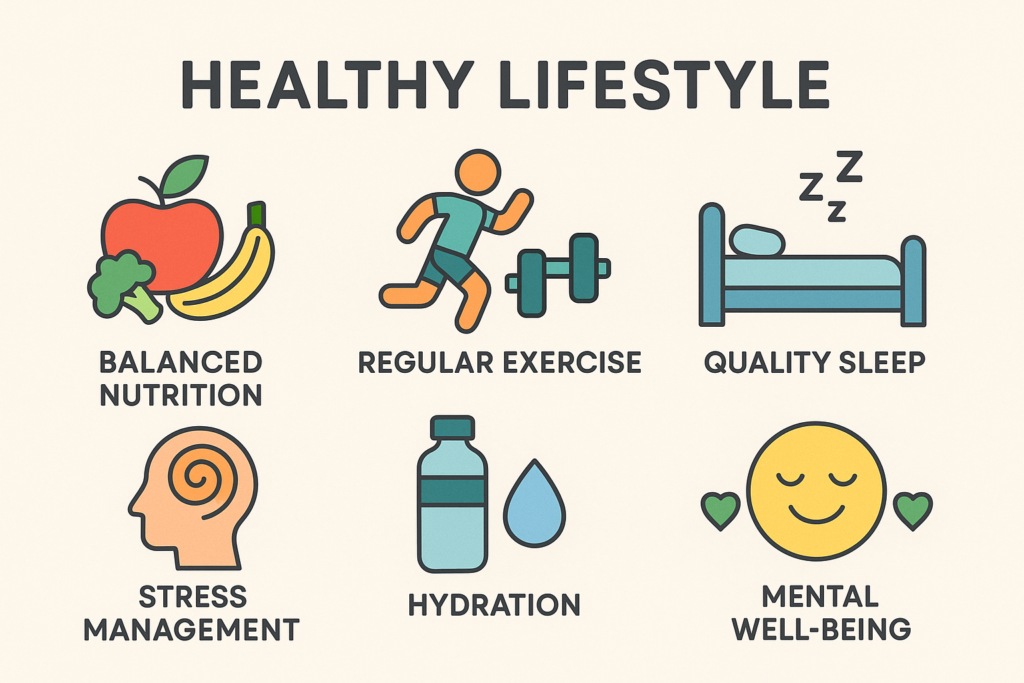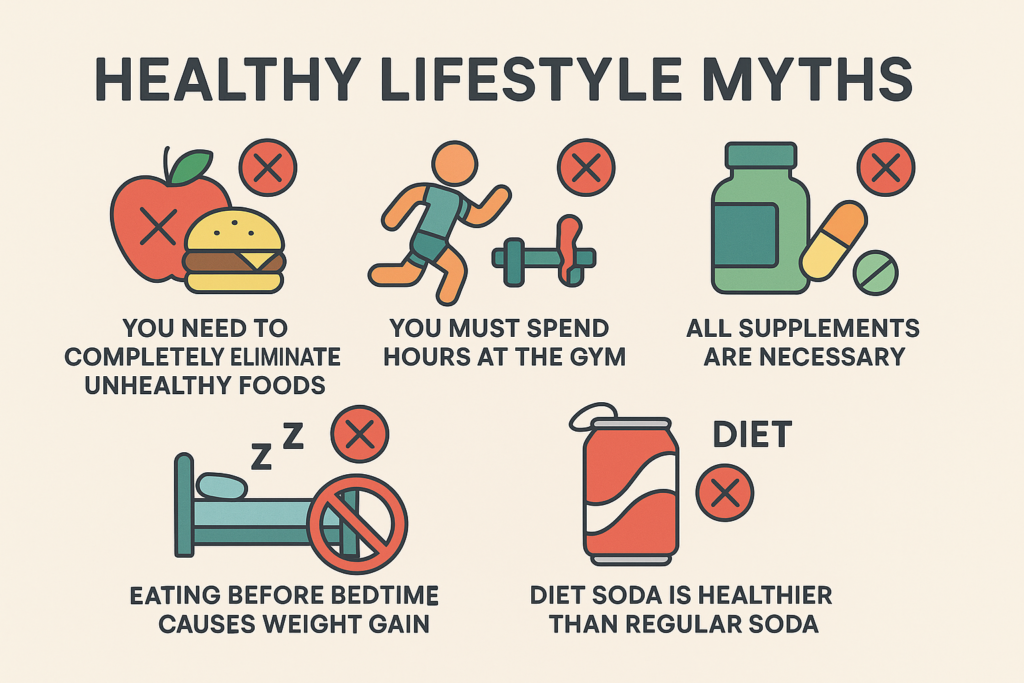In today’s fast-paced world, maintaining a healthy lifestyle has become more essential than ever. A healthy lifestyle is not just about eating salad or going to the gym occasionally—it’s a holistic approach that includes physical, mental, and emotional well-being. According to the World Health Organization (WHO), a healthy lifestyle can prevent up to 80% of premature heart disease, stroke, and type 2 diabetes.
In this ultimate guide, we’ll explore the key components of a healthy lifestyle, break down the science-backed benefits, analyze real-life case studies, and provide actionable tips that you can implement today.
What is a Healthy Lifestyle?
Definition and Overview
A healthy lifestyle involves making daily choices that lead to long-term physical, mental, and emotional well-being. These choices include:
- Balanced nutrition
- Regular physical activity
- Quality sleep
- Mental wellness practices
- Avoidance of harmful habits like smoking and excessive drinking
WHO’s Definition
The World Health Organization defines health as “a state of complete physical, mental, and social well-being, and not merely the absence of disease or infirmity.” This definition broadens the concept of a healthy lifestyle to include social connections and emotional resilience.
Why is a Healthy Lifestyle Important?
1. Disease Prevention
Living a healthy lifestyle significantly lowers the risk of:
- Cardiovascular disease
- Obesity
- Type 2 diabetes
- Certain cancers
- Depression and anxiety
2. Increased Life Expectancy
A Harvard University study published in Circulation journal found that individuals who followed five healthy habits (diet, exercise, maintaining a healthy weight, moderate alcohol intake, and no smoking) lived over 10 years longer than those who didn’t.
3. Enhanced Quality of Life
Healthy individuals report:
- Higher energy levels
- Better focus and productivity
- Improved mood and mental clarity

Key Components of a Healthy Lifestyle
1. Balanced Nutrition
Eat Whole Foods
Focus on:
- Fruits and vegetables
- Whole grains
- Lean proteins (chicken, fish, legumes)
- Healthy fats (avocados, nuts, olive oil)
Limit Processed Foods
Reduce intake of:
- Refined sugars
- Trans fats
- Excessive salt
Hydration
Drink at least 8–10 glasses of water daily. Hydration boosts metabolism, supports brain function, and flushes toxins from the body.
2. Physical Activity
Exercise Recommendations
The WHO recommends:
- 150 minutes of moderate-intensity aerobic activity weekly (e.g., brisk walking)
- Muscle-strengthening activities on 2 or more days a week
Everyday Movement Matters
Even small changes can make a big difference:
- Take stairs instead of elevators
- Walk or bike for short distances
- Stretch during work breaks
3. Quality Sleep
Sleep Requirements
Adults need 7–9 hours of sleep per night. Sleep helps in:
- Memory consolidation
- Muscle repair
- Hormonal balance
Tips for Better Sleep
- Avoid screens 1 hour before bed
- Maintain a consistent sleep schedule
- Create a dark, cool, and quiet sleeping environment
4. Mental and Emotional Wellness
Mindfulness & Stress Management
Practice:
- Meditation
- Deep breathing exercises
- Journaling
Social Connection
Strong relationships are associated with lower rates of anxiety and depression, according to the Harvard Study of Adult Development, one of the longest studies on human happiness.
Digital Detox
Limit screen time and avoid doom-scrolling. Designate “tech-free” hours during the day.
5. Avoid Harmful Habits
- Quit smoking
- Limit alcohol to moderate levels
- Avoid drug use
- Manage caffeine intake
Case Study: The Blue Zones – Living a Naturally Healthy Lifestyle
The Blue Zones are five regions in the world where people live significantly longer and healthier lives. These include:
- Okinawa (Japan)
- Sardinia (Italy)
- Nicoya (Costa Rica)
- Ikaria (Greece)
- Loma Linda (California, USA)
What Do They Have in Common?
- Plant-based diets
- Regular low-intensity physical activity
- Strong social ties
- A sense of purpose (“Ikigai” in Japan)
- Stress-reduction habits like prayer and naps
This case study shows that healthy lifestyle habits, when ingrained in daily life and culture, can lead to extended longevity and well-being.
Scientific Research from WHO & Harvard
WHO Insights
The WHO’s Global Health Estimates show that non-communicable diseases (NCDs)—such as heart disease, diabetes, and cancer—account for over 70% of deaths worldwide. These are largely preventable through healthy lifestyle interventions.
Harvard Research Findings
Harvard T.H. Chan School of Public Health highlights five key behaviors that lower the risk of premature death:
- Never smoking
- Maintaining a healthy weight (BMI 18.5–24.9)
- Regular physical activity (30+ minutes/day)
- Moderate alcohol consumption
- Healthy eating habits
Each additional habit adopted increases life expectancy by several years.
Creating Your Personalized Healthy Lifestyle Plan
Step 1: Set Realistic Goals
Use the SMART method:
- Specific
- Measurable
- Achievable
- Relevant
- Time-bound
Step 2: Build Habits Gradually
Start small:
- Walk 15 minutes a day
- Replace soda with water
- Meditate for 5 minutes in the morning
Step 3: Track Your Progress
Use apps like:
- MyFitnessPal (for nutrition)
- Strava (for workouts)
- Sleep Cycle (for rest)
Step 4: Stay Consistent
Consistency > Perfection. One bad day won’t ruin your progress—just keep moving forward.

Common Myths About a Healthy Lifestyle
Myth 1: You Need to Go to the Gym Every Day
Truth: Walking, stretching, dancing, or even gardening counts as physical activity.
Myth 2: Healthy Food is Always Expensive
Truth: Beans, lentils, rice, oats, seasonal fruits, and vegetables are both healthy and budget-friendly.
Myth 3: You Need to Be Perfect
Truth: Aim for balance, not perfection. It’s okay to indulge occasionally.
FAQs About Healthy Lifestyle
1. How can I start living a healthy lifestyle today?
Start by drinking more water, moving your body for 15–30 minutes, and eating more fruits and vegetables.
2. How long does it take to see results from a healthy lifestyle?
Some benefits, like better sleep and mood, can appear in a few days. Weight loss and disease prevention take weeks or months.
3. Can I have cheat days?
Yes. Occasional indulgence won’t hurt your progress—just maintain overall consistency.
4. Is it too late to start a healthy lifestyle?
It’s never too late. Even people in their 60s and 70s see improvements in energy, health, and longevity with lifestyle changes.
Conclusion
A healthy lifestyle is more than just a goal—it’s a lifelong journey. Backed by the research of global health authorities like WHO and institutions like Harvard, the benefits are undeniable: longer life, less disease, better mood, and more energy.
You don’t need to change everything overnight. Small, consistent actions build powerful results over time. Whether it’s eating one more vegetable a day, walking around the block, or turning off your phone an hour earlier—you’re taking a step toward a better you.





